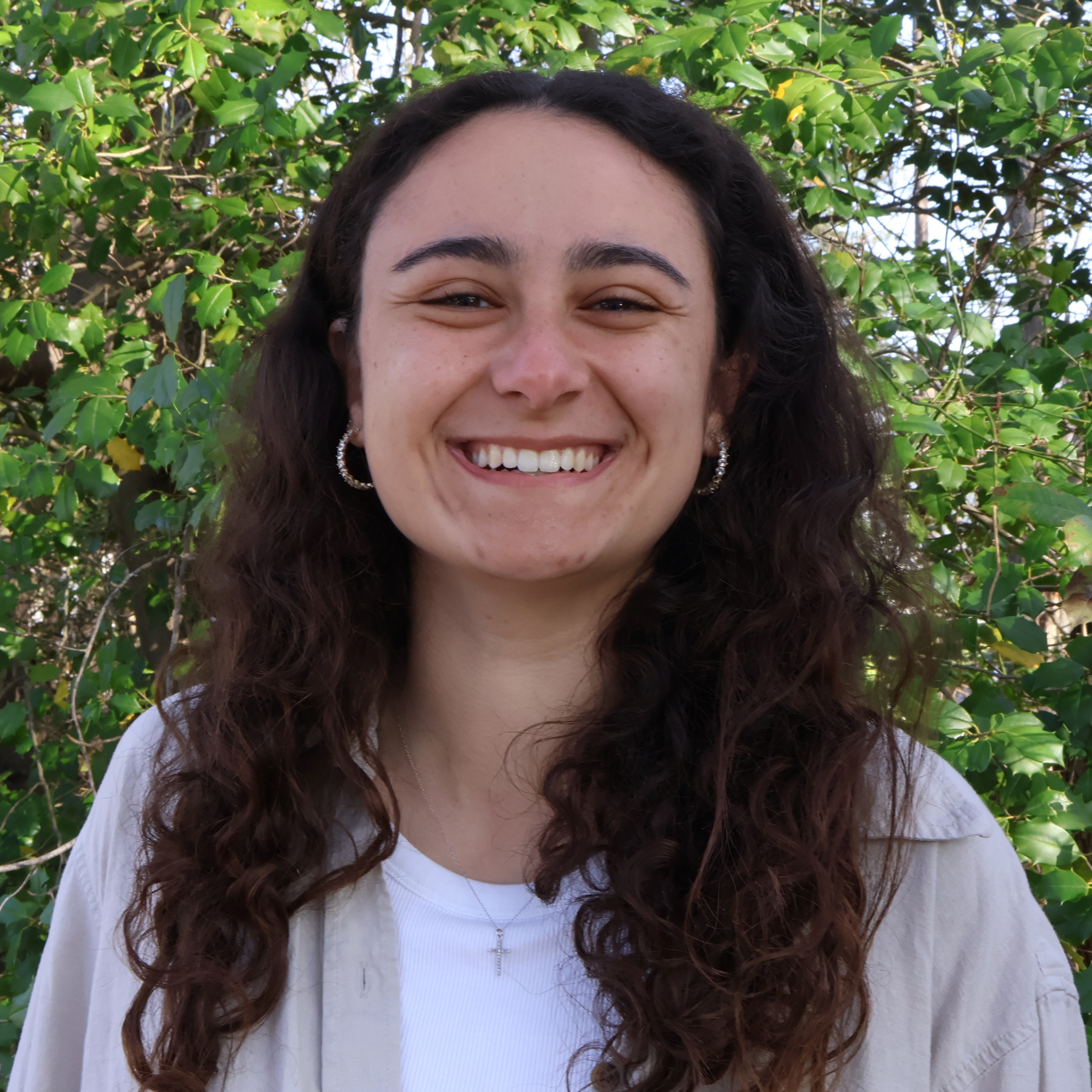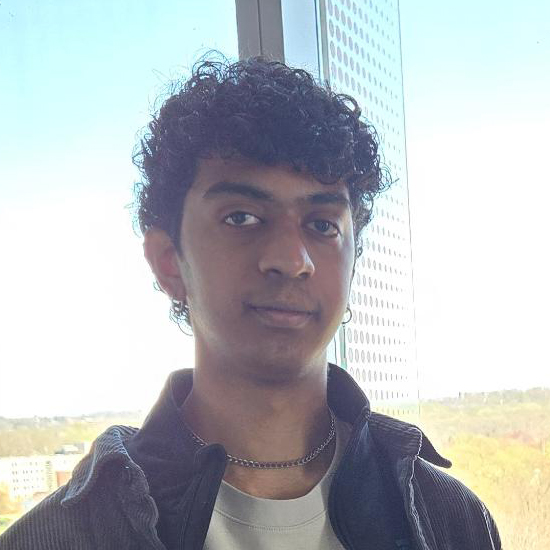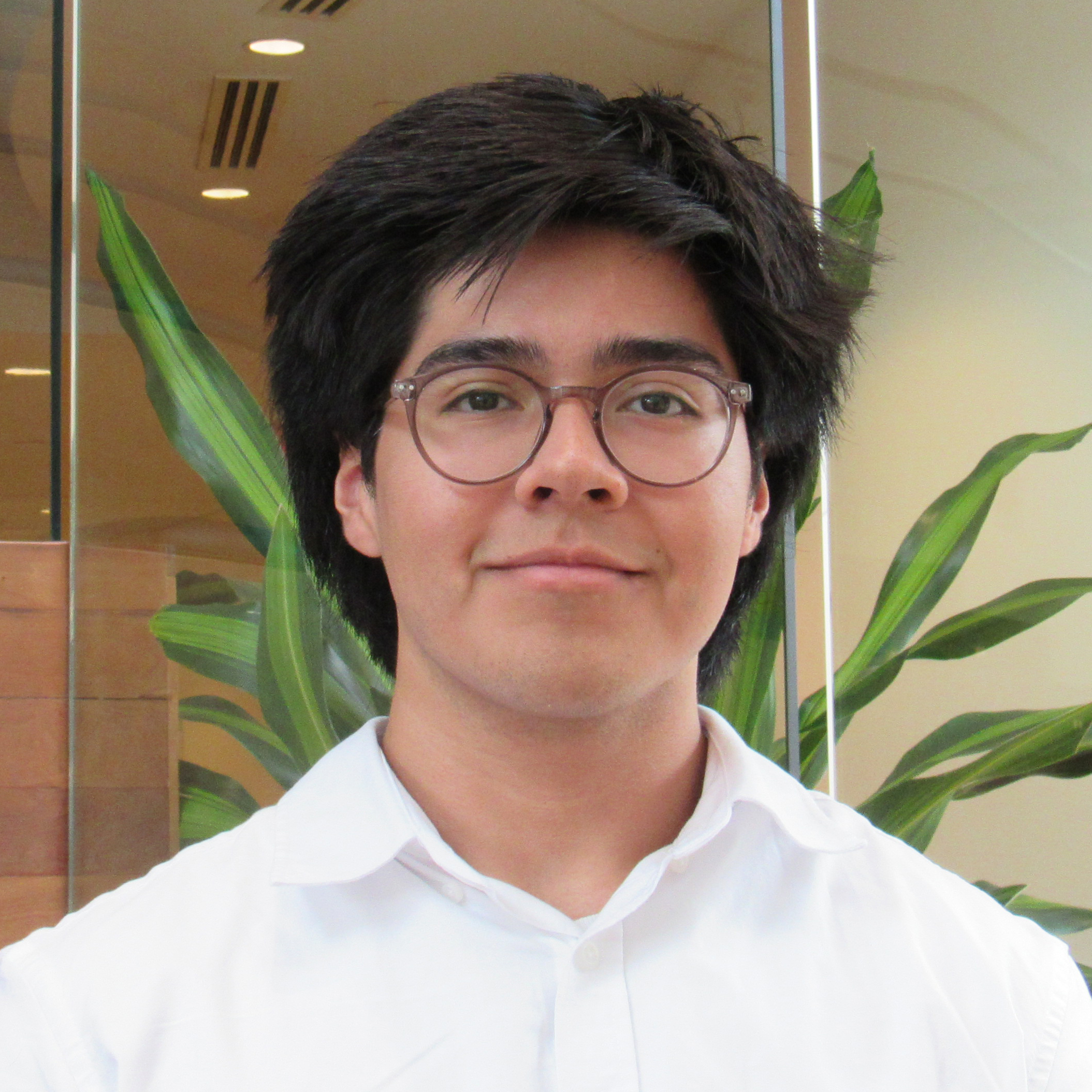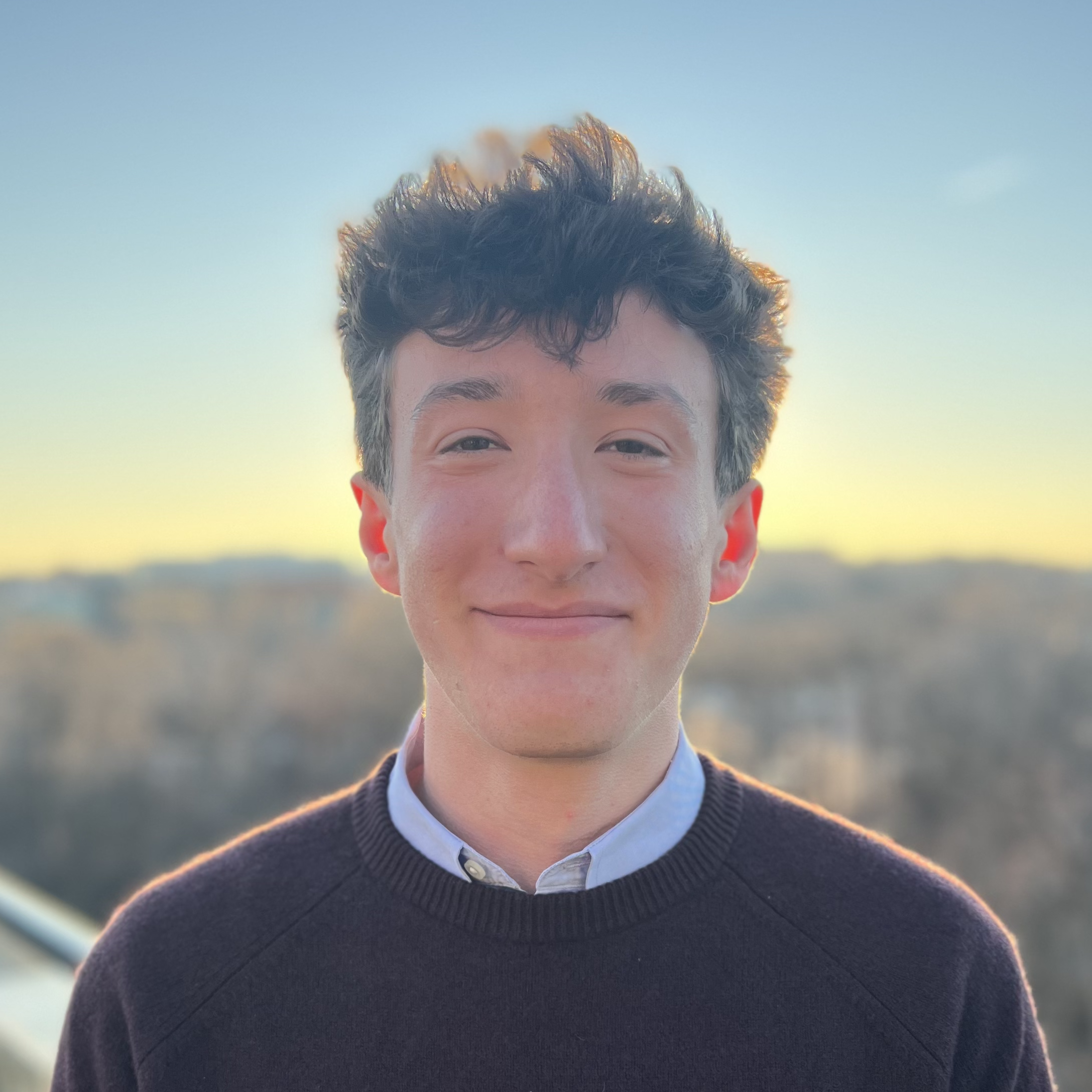Junior computer science and mathematics double major Brooke Guo analyzes neural connections to understand the causes of complex brain conditions like schizophrenia.

When Brooke Guo arrived at the University of Maryland as a freshman in 2022, she knew she wanted to help people and work in a health-related field someday. Initially, she thought that meant she was destined to become a doctor. But she soon changed her mind during her first year at Maryland.
“I found out that going to medical school didn’t really appeal to me much,” said Guo, who is now a junior computer science and mathematics double major. “After starting my classes at UMD, I soon realized that there were a lot of other ways I could still help people and improve health outcomes for everyone.”
While she was searching for a research opportunity that would fulfill requirements for the Integrated Life Sciences program in the Honors College, Guo was quickly drawn to Jonathan Simon, a professor with joint appointments in the Department of Electrical and Computer Engineering, Department of Biology and the Institute for Systems Research.
“I saw that his work was a combination of neuroscience and computational analysis,” Guo explained. “It jumped out to me because it uniquely blended these disciplines that I’m interested in while also doing the fundamental work that doctors will rely on to treat patients. So, I applied, got in and I’ve been conducting research there ever since my freshman spring semester.”
Numbers and neurons
For the past two years, Guo has dedicated herself to examining brain connectivity data in Simon’s lab. Her research focuses on two distinct types of neural connections: structural and functional.
“Structural connectivity is the physical connection between brain regions—so, the actual neurons going from one place to another,” Guo explained. “Functional connectivity, on the other hand, is about brain regions that work together. For example, when your ear hears something, one part of your brain registers the sound and another part interprets the meaning of that sound. They’re functionally connected, regardless if there’s a direct structural connection.”
This distinction is particularly important for understanding conditions like schizophrenia, where auditory hallucinations are a common symptom. Researchers have observed physical brain connection differences in people with schizophrenia, but the relationship between structural and functional connectivity remains unclear. Understanding the links could help doctors diagnose patients earlier, which can enhance quality of life and reduce potential long-term complications for people with the condition.

To investigate these relationships, Guo uses diffusion tensor imaging (DTI), a specialized MRI technique that tracks water movement through neural tissue. Working with DTI scans taken from subjects across D.C., Maryland and Virginia, Guo compares connectivity patterns between people with and without schizophrenia.
“DTI scans kind of look like colorful, abstract art pieces, but it’s one of the only ways to track structural connectivity that we currently have,” Guo said. “Water diffuses along the direction of neural fibers and the scan shows this water movement. By analyzing these patterns, we can map the brain’s structural highways.”
The work is challenging. In a single brain region, thousands of neurons might intersect in different directions. Simon noted that Guo developed a strong scientific intuition, which helped guide the project.
“When faced with roadblocks, she’s shown great persistence in figuring out how to overcome them,” Simon said. “These qualities set her apart as an outstanding young researcher, especially at the intersection of neuroscience and computation.”
Guo’s background in computer science and applied math played a key role in her work. Using the programming languages Python and R, she processes and statistically analyzes complex datasets, hoping to identify meaningful patterns that may signal the development of schizophrenia in a human brain and point to better ways to diagnose the condition.
“If we can identify specific connectivity patterns and structures associated with schizophrenia, scientists and health care workers might eventually develop better diagnostic tools,” Guo said. “For a long time, diagnosis has heavily relied on observing behavioral symptoms, which could be similar to those linked with other unrelated conditions. Having a distinct neurological marker would be tremendously helpful for patients suffering from schizophrenia.”
Breaking new ground in brain science
Guo’s research has already yielded some intriguing findings that could open new avenues of study for Simon’s lab. She recently began a parallel study with her graduate student mentor, electrical engineering Ph.D. student Vrishab Commuri, on how brain connectivity changes as humans grow older.
“Brooke is working on a project in our lab that aims to quantify the changes in the ‘circuitry’ of brain connections that naturally occur with age,” Commuri said. “These circuits carry bioelectric signals between important brain areas, so even mild degradation might give rise to mild neurological impairment associated with healthy aging.”
Preliminary findings from their project suggest that older adults (aged 65-78 years) had stronger functional connections in their temporal lobes (parts of the brain near ears that handle hearing, memory and language), which corresponded with the shorter, more direct physical connections between those brain areas. Meanwhile, younger adults (aged 18-26 years) showed stronger communication between frontal lobe areas (brain regions responsible for thinking and decision-making.
Guo believes that this work may one day help researchers better understand normal brain aging and neural conditions like schizophrenia that occur where connectivity changes over time. She hopes that her data analyses and development of computational tools might eventually go beyond research to improve patient care.
“Even though I’m not directly prescribing medicine or providing therapy to patients, I can provide them with the basis for better strategies to treat their conditions,” Guo said. “I probably won’t become a medical doctor, but my goal is to continue helping people by completing this crucial and fundamental research.”
Article reposted from https://cmns.umd.edu/news-events/news/mapping-mind
Four undergraduates in the University of Maryland’s College of Computer, Mathematical, and Natural Sciences (CMNS) have been awarded 2025 scholarships by the Barry Goldwater Scholarship and Excellence in Education Foundation, which encourages students to pursue advanced study and research careers in the sciences, engineering and mathematics.
Over the last 16 years, UMD’s nominations yielded 53 scholarships—second in the nation only to Stanford.
UMD’s 2025 Goldwater Scholars are:
- Clara Abdelmalek, junior neuroscience major
- Harikesh Kailad, sophomore computer science and mathematics double major
- Luiz Mata Lopez, junior computer science and mathematics double major
- Benjamin Raufman, junior chemistry and mathematics double-degree student
They are among 441 Goldwater Scholars selected from 1,350 nominees nationally. Goldwater Scholars receive one- or two-year scholarships that cover the cost of tuition, fees, books, and room and board up to $7,500 per year.
“I am very proud of Clara, Harikesh, Luiz and Benjamin, whose amazing scholarship, dedication and hard work represent what CMNS strives for,” CMNS Dean Amitabh Varshney said. “Being named a Goldwater Scholar is an incredible accomplishment, and I cannot wait to see how they use this opportunity to make an even greater impact on the world.”
Since the program's first award in 1989, the Goldwater Foundation has honored 86 winners and five honorable mentions from UMD.
“The 2025 UMD Goldwater scholars are an exceptional group whose current and future research will impact science and society,” said CMNS Associate Dean of Undergraduate Education Robert Infantino, who has led UMD’s Goldwater Scholarship nominating process since 2001. “I am especially delighted that a UMD transfer student nominee was named a Scholar for the first time. The competition is also extra challenging for sophomores, so Hari’s accomplishment is also particularly noteworthy.”
Clara Abdelmalek
Abdelmalek began interning in Youssef Kousa’s viral neurobiology lab at Children’s National Hospital in Washington, D.C., the summer before her freshman year at Maryland. Kousa asked her to connect with over 30 investigators in the Prenatal Infection and Neurodevelopmental Genetics (PING) Consortium, which he founded to identify factors modulating prenatal brain injury and postnatal neurodevelopmental outcomes for Zika and other prenatal viral infections.

Abdelmalek collected detailed information about the consortium’s formation and the studies that comprise the PING clinical and genomic biobanks, which she published in a first-author paper earlier this year in the journal Pediatric Research.
Her work at Children’s led Abdelmalek to propose using an experimental animal system from Kousa’s lab for her Gemstone honors team research project. She proposed using the animal model to test potential drug treatments for prenatal Zika infection, which can cause severe brain injury and a spectrum of neurodevelopmental disorders. Abdelmalek’s 13-member group called Team VIRAL is working to test the effectiveness of the drugs in increasing survival rate, pinpoint the optimal doses for those drugs, evaluate the extent to which the drugs can mitigate prenatal brain injury and establish the drugs' safety. The Gemstone team received the Audience Choice Award at the Gemstone Do Good Showcase last year and 2nd place at the Library Awards for using the university libraries in its research.
"Clara will do extraordinary things with her career due to her intelligence, motivation and willingness to pursue difficult tasks,” said Erin Tran, the Gemstone team’s mentor and a senior lecturer in UMD’s Department of Cell Biology and Molecular Genetics. “One of Clara’s strongest attributes is her ability to take initiative and turn ideas into practical plans and experimental progress. She is excellent at asking probing questions that guide the direction of the research project, which is one of the most important aspects of being a scientist."
Abdelmalek also spent a year in Mark Batshaw’s clinic at Children’s National Hospital, conducting developmental tests for children with autism, intellectual disabilities, ADHD and genetic disorders. She and a colleague analyzed the relationship between patient demographics and the age of autism diagnosis for almost 4,000 patients.
Outside the lab, Abdelmalek serves as president of Maryland Cru, a Christian ministry. She also received the Clifford and Camille Kendall CMNS Dean's Scholarship, Louise Ogle Scholarship, and Dean's Scholarship.
After graduation, Abdelmalek plans to pursue an M.D./Ph.D. and focus on personalized medicine.
“I aim to build on my neuroscience background and research experience in genetics and neurodevelopment to develop personalized therapies for neurodevelopmental disorders,” she said.
Harikesh Kailad
Kailad began conducting research at UMD with Computer Science Professor Bill Gasarch in high school. He currently works in the Maryland Cybersecurity Center with Computer Science Assistant Professor Ian Miers, building systems that enable forums that both preserve privacy and allow for moderation, which helps prevent spammers and trolls. Kailad developed a full-fledged flexible system that allows services such as Wikipedia and Reddit to use his framework. He also began working on a project using multiparty computation for anonymous private state, which is when two or more parties receive an output of a computation based on their combined data without revealing their own data to the other parties.

"Hari has shown consistent initiative, pushing himself in coursework, research and teaching,” Miers said. “As a freshman, he taught a student-led class on binary exploitation with an ambitious plan to cover beyond what is covered in even the upper-level security class. At the same time, he completed an independent study with me on zero-knowledge proofs that resulted in a paper to appear at USENIX Security 2025, a top-tier peer-reviewed venue in computer security research.”
Kailad also works with Dana Dachman-Soled, an associate professor of electrical and computer engineering, on the security of post-quantum systems. This collaboration began when Kailad participated in the Research Experience for Undergraduates in Combinatorics, Algorithms, and AI for Real Problems at UMD.
Cryptography currently used to secure the web is vulnerable to attacks by quantum computers, but the security of post-quantum cryptosystems being deployed is not well studied. Kailad wrote code to attack Kyber, a post-quantum cryptosystem finalized by the NIST standardization process. His attack transforms side-channel information that leaks from the system into algebraic information that can then be used to attack the system and find secret keys.
Kailad serves as president of the Cybersecurity Club, designed and taught two student-initiated courses, cofounded a theoretical computer science reading group, and is a member of a top-ranking Capture the Flag team that participates in cybersecurity competitions on the international level. While at UMD, he received a CMNS Alumni Network Summer Research Award and a Maryland Cybersecurity Center Travel Grant.
After graduation, Kailad plans to pursue a Ph.D. in computer science and contribute to cryptography and private technology development.
“I am extremely excited about recent advancements in security and cryptography and strongly interested in bringing anonymity and privacy to the web by using and improving privacy-enhancing technologies and answering questions about the security and efficiency of such systems,” he said.
Luiz Mata Lopez
Mata Lopez is a first-generation college student who was directly admitted to UMD’s limited-enrollment computer science program as a transfer student from Montgomery College in fall 2023.

He was not unfamiliar with the College Park campus, though. He spent the summer of 2022 at UMD participating in a Research Experiences for Undergraduates program called BRIDGE (Bioinformatics Research In Data science for GEnomics), which is run by the UMD Center for Bioinformatics and Computational Biology. In the BRIDGE program, Mata Lopez worked with Computer Science Assistant Professor Erin Molloy to computationally address the problem of estimating the evolutionary histories of many species. Specifically, he worked to speed up the performance of an existing software package to improve usability for biologists.
After transferring to UMD, he rejoined Molloy’s research group to develop methods for fast reconstruction of tumor evolution. He conducted a preliminary study elucidating the detrimental effects of using standard approaches on cancer data and started working on multiple algorithms that address large-scale genome losses, which refer to a significant evolutionary process involving the deletion of extensive portions of a genome.
"Luiz is extremely talented. In our group meetings, he regularly presents his own algorithmic ideas at the whiteboard and responds to questions on the fly—skills typically honed during the transition from undergraduate to graduate studies,” Molloy said. “He is also deeply passionate about STEM research and has presented at Montgomery College and other forums to inspire fellow undergraduates to get involved. I am excited to see Luiz's proposed research come to fruition with the generous support of the Goldwater Scholarship."
Beginning in summer 2023, Mata Lopez interned at the National Institutes of Health’s National Library of Medicine on a project to use nanopore sequencing to elucidate the biological mechanisms of mobile DNA elements in the context of cancer development.
Last summer, he interned at the Broad Institute of MIT and Harvard on a dilated cardiomyopathy drug discovery pipeline. He merged imaging datasets from CRISPR and known responsive drug screens and analyzed them to identify gene edits that have similar effects as the drugs.
Mata Lopez served as a Montgomery College STEM Ambassador and received the Jack Kent Cooke Undergraduate Transfer Scholarship and Frederick Douglass Scholarship from UMD. His passion for education led him to create educational content with students nationwide to introduce biological sciences majors to bioinformatics software development.
Mata Lopez plans to pursue a Ph.D. in computer science, specializing in computational biology and statistical methods to better understand the origins of genetic disorders.
“I aim to address the genetic origins of diseases that have long mystified clinicians,” he said. “Recent computational advancements have enabled biomedical data analysis at an incredibly large scale and have led to a better understanding of disease mechanisms and rapid drug development.”
Benjamin Raufman
Raufman, a Banneker/Key Scholarship recipient in the Integrated Life Sciences program in the Honors College, has been conducting research in a chemistry lab at Towson University since his sophomore year of high school.

There, he investigates the synthesis and properties of inorganic nanostructures, specifically gold nanoclusters. Raufman developed a reliable and reproducible synthetic protocol to make platinum-doped gold-11 nanoclusters—research he published in a first-author paper earlier this year. Platinum doping enhances the reactivity and stability of the gold nanoclusters and alters the electronic and optical properties of the nanoclusters, leading to unique characteristics. He also helped engineer nanoclusters with fluorescent ligands, which led to a co-authored paper published in 2024.
He was honored with a Maryland American Chemical Society Chapter Summer Research Grant in 2022, and his research presentation was selected for the prestigious Sci-Mix at the American Chemical Society Spring Meeting in 2024.
"I have known Benjamin for five-plus years, and he has consistently demonstrated exceptional scientific knowledge and experimental skill. This includes reading the literature, thinking critically and independence in designing experiments,” said Mary Sajini Devadas, an associate professor of chemistry at Towson University. “Since joining my lab as a sophomore in high school as part of my 2020 TU foundation grant titled ‘Building Science Identity: Fostering STEM influx from local high schools,’ he has worked nonstop while balancing his coursework and research."
Since his freshman year at UMD, Raufman also worked with Chemical and Biomolecular Engineering Professor Srinivasa Raghavan to assess the effectiveness of polymer-based hemostatic agents needed during surgery and in emergency rooms to control bleeding after traumatic injury.
For the past two summers, Raufman interned with Jian-Ying Wang, the Joseph and Corrine Schwartz Professor of Surgery and a Professor of Pathology at the University of Maryland School of Medicine. There, he investigated the roles of circular RNAs, specifically circCdr1as, in regulating intestinal mucosal regeneration and human diseases. Through this work, he co-authored a paper published in 2024 in the journal JCI Insight.
Outside of class, Raufman is a refugee youth tutor and emergency department volunteer, and he played alto saxophone in the University Jazz Band. After he graduates, he plans to pursue an M.D./Ph.D. in structural biology.
“I aim to advance the mechanistic understanding of cancer with the long-term goal of developing novel targeted therapies,” he said. “My clinical experience will ground my research in real-world relevance and enable me to translate advances in structural and chemical biology into clinically efficacious and affordable treatments.”
Congratulations to our colleagues who won the 2025 Frontiers of Science Award:
- - Dan Cristofaro-Gardiner, for his join paper with Humbler and Seyfaddini: “Proof of the simplicity conjecture”, Annals of Mathematics 2024.
- - Dima Dolgopyat & Adam Kanigowski, for their joint paper with Federico Rodriguez Hertz: “Exponential mixing implies Bernoulli”, Annals of Mathematics 2024.
- - Tamas Darvas for his paper: “The Mabuchi completion of the space of Kahler potentials”, American Journal of Mathematics 2017.
The Frontiers of Science Award was inaugurated in 2023 in the International Congress for Basic Sciences (ICBS). It is sponsored by the City of Beijing and the Yanqi Lake Beijing Institute of Mathematical Sciences and Application (BIMSA). Awards are given in Mathematics, Physics, and Theoretical Computer and Information Sciences.
For more information see https://www.icbs.cn/site/pages/index/index?pageId=1fe7d1cf-c69c-47bd-a2fa-3d5731ca2610
Congratulations to all award winners!!
We are very excited to report that our MAryland Putnam team ranked 7th among 477 institutions that participated in the 2024 Putnam math competition.
Our team members this year were Daniel Yuan, Isaac Mammel, and Clarence Lam.
Daniel Yuan ranked 26th among 3,988 participants. Clarence Lam and Isaac Mammel were recognized for being among the top 200 students. Omar Habibullah, Samuel Lidz, Adam Melrod, and Kelin Zhu were also recognized for being among the top 500 students.
Visit https://maa.org/putnam/ for more information
Maryland Global, published a great interview with our visiting professor (and diplomat), Qendrim Gashi.
The interview is available at https://marylandglobal.umd.edu/about/news/math-olympiads-diplomacy-meet-visiting-math-professor-qendrim-gashi
Archives: F2011-S2012 F2012-S2013 F2013-S2014 F2014-S2015 F2015-S2016 F2016-S2017 F2017-S2018 F2018-S2019 F2019-S2020 F2021-S2022 F2022-S2023 F2023-S2024 F2024-S2025
-
Where do all the scores come from? – generation accuracy of diffusion model, and multimodal sampling via denoising annealing
Speaker: Molei Tao (Gatech) - https://mtao8.math.gatech.edu/
When: Tue, October 7, 2025 - 3:30pm
Where: Kirwan Hall 3206
College Park, MD 20742-4015
P: 301.405.5047 | F: 301.314.0827